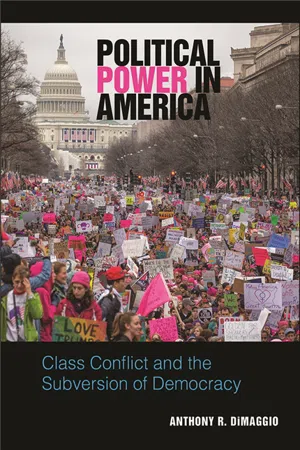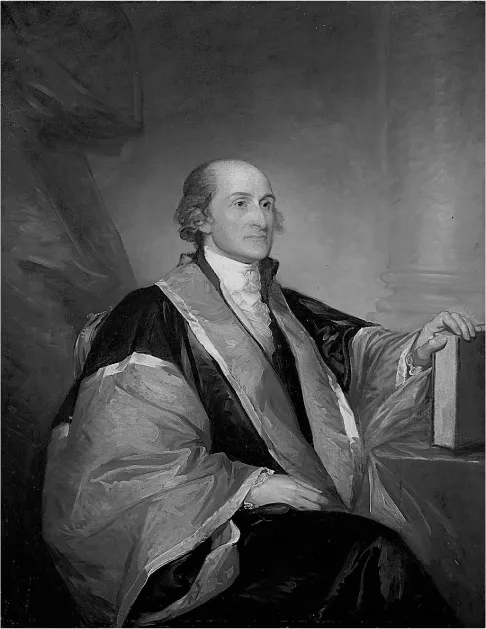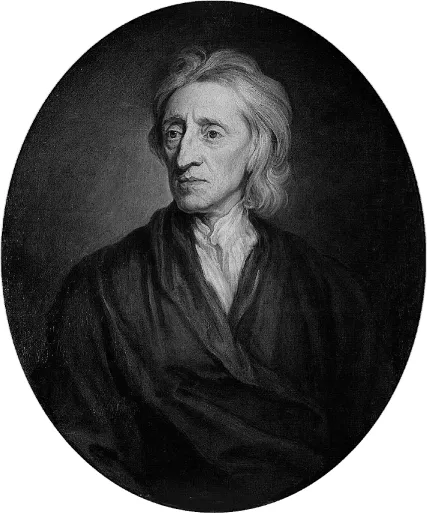![]()
Chapter 1
Theories of Government, Early American History, and the Politics of Class Conflict
Framer of the U.S. Constitution and first Chief Justice of the Supreme Court John Jay was hardly democratic in his politics. He famously sided with members of the upper class when he wrote that “the people that own the country ought to govern it.”1 Although respected today by many in the scholarly legal community, Jay was no savior of the working man or woman. Born to a wealthy New York merchant family, Jay was opposed to slavery, but his politics in the run-up to the Revolutionary War were far from radical. His interests were with the upper class; his own background was one of decadent wealth, as his family was one of the richest in New York City. He owned multiple homes at a time when most Americans owned no land. His wealth was drawn from numerous sources, including his salary as a lawyer, banking assets, and the large amounts of land inherited from his father.2 If any framer of the Constitution was a strong supporter of propertied elites, it was John Jay.
Jay was just one of 55 framers of the Constitution, but his background is symbolic of a broader phenomenon in which those who founded the United States disproportionately held personal economic interests in creating a Constitution that served the wealthy. One historical researcher argues that the framers actively sought to foster “a conservative counterrevolution against what leading American statesmen regarded as the irresponsible economic measures enacted by a majority of state legislatures in the mid-1780s,” which demonstrated an “excess of democracy” via prioritizing aid to the masses and poor by promoting tax and debt relief during a time of economic depression.3
This chapter is devoted to laying out an “economic interpretation” of U.S. Constitutional history, to borrow a phrase from historian Charles Beard. As Beard argued, the Constitution’s framers were strongly motivated by their own personal economic interests. Their economic backgrounds as lawyers, land owners, debt holders, slave owners, and businessmen with mercantile, shipping, and manufacturing interests meant they were part of an upper class, which was more likely to side with the priorities of their fellow class members, rather than with those of small land owners, non-propertied males, and other socially disadvantaged groups.4
Image 1.1. John Jay, Framer to the U.S. Constitution.
Most Americans are ignorant to the historical details of the country’s founding. We are taught we live in the “land of the free” and the “home of the brave.” We are told that the Founding Fathers created American democracy. They are practically deified in classrooms, and celebrated as central to our cultural heritage. But this whitewashing of history obscures the class tensions characterizing American society during the founding. The myth of the benevolent Founding Fathers obscures the ways in which they distrusted and opposed democracy. In this chapter I reject many of the myths associated with the founding, while also discussing positive values of the Enlightenment period that contributed to the eventual democratization of U.S. politics. Western history is characterized by a conflict between democratic and elitist values, and the American people have seen many successes in democratizing American society over the last two centuries, contrary to upper-class efforts to limit democratization.
Liberalism in Context
When we talk about modern government, we are really talking about liberal government. Modern history is defined by the ascendancy of liberalism. This means the prevalence of representative government over dictatorship. When I speak of liberalism, I am not talking about modern day Republicans and Democrats. Historically, liberal theory refers to a governing framework based on respect for human rights, representation, and limited government. The rise of liberalism was a serious challenge to monarchies. Under monarchical systems, the kings, queens, and aristocrats who controlled the state saw themselves as society’s rightful rulers. Liberal government—in which political officials are restrained by the public—did not for the most part exist during the era of monarchies.
John Locke (1632–1704) is widely credited with developing the intellectual rationale that eventually led to modern, liberal representative government. Locke was more concerned with what government could do to protect the public during times of turmoil. He helped establish a system of thought that was more representative of public wishes than anything imagined by previous Western philosophers.
Locke’s liberalism was based in the Enlightenment. The Enlightenment was a historical period of intellectual thought in Western Europe during the eighteenth century, which continued into colonial America, with the thinking and writings of the Founding Fathers and framers of the Constitution. As one scholar explains, the Enlightenment produced “people [who] started to question all forms of authority” existing prior to the emergence of representative government. It was “a movement against religious intolerance and arbitrary rule” and was responsible for “threatening courts, princes, and lay and clerical oligarchies” that ruled contrary to the interests of the masses.5 The Enlightenment popularized the idea of representative government. It embraced the notion that people were endowed with rationality and reason, and that monarchies were illegitimate, because individuals can be trusted to govern based upon their own self-interest and capacity to hold political leaders accountable. The Enlightenment forwarded the radical notion that kings were not divinely ordained to rule, and that individuals have natural rights guaranteed by their creator. For government to be legitimate, it must establish a social contract with individuals—with public demands represented by political leaders elected by the people.
In his Second Treatise of Government, Locke wrote of the need for government by consent, with all men being born equal and holding “a right to freedom.” He wrote of the “public good”—understood today as the greatest good for the largest number of people. The public good was tied to the idea that men are born with God-given rights. Locke wrote of the “equality of men by nature.” Individuals enjoyed a human right to security, and are not to harm others’ “life, health, liberty, or possessions.” “The preservation of property” was the primary “end of government” and the main “reason why men enter into society.”6
Locke felt government was needed to protect individuals from each other. He felt government should do more for men than “keeping them safe” from fellow citizens and foreign dangers, as the philosopher Thomas Hobbes had previously argued. Public consent is based on political systems in which people unite, authorizing government “to make laws for [them] as the public good of the society shall require.”7 Locke did not lay out a step-by-step plan of what constituted a violation of the public good. But this is the point. Determining government violations of the public trust and human rights falls on the public.
Still, Locke had in mind some grievances when he spoke of government violations of the rights of man. He wrote that “whenever the legislative acts against the trust reposed in them, when they endeavor to invade the property of the subject … whenever the legislators endeavor to take away and destroy the property of the people, or reduce them to slavery under arbitrary power, they put themselves into a state of war with the people.” Locke referenced the problem of taxation without representation. He wrote of the problems of “absolute obedience and submission” which officials expect under “absolute monarchy.” These expectations are “indeed inconsistent with civil society.” Locke also supported limited government in his call for “restraining any exorbitances of those [government] to whom they [the public] had given the authority over them, and of balancing the power of government, by placing several parts of it in different hands.”8 Attempts to ensure “checks and balances” later appeared in the U.S. Constitution, seeking to prevent arbitrary authority by a president, congress, or the courts.
Image 1.2. John Locke, 1632–1704.
Locke’s liberal ideas served as a foundation for the principles embraced in the American Revolution of 1776. Locke’s influence is apparent in the Declaration of Independence, which overlaps heavily with his Second Treatise of Government. The Declaration borrowed directly from Locke’s notion of God-given rights, stating: “We hold these truths to be self-evident, that all men are created equal, that they are endowed by their Creator with certain unalienable rights, that among these are Life, Liberty, and the pursuit of Happiness.” The Declaration’s reference to rights to life, liberty, and happiness corresponds with Locke’s discussion of the rights of man, which include life and liberty, and property. This overlap is not coincidental, as Thomas Jefferson was strongly influenced by Locke’s writings.9
The Declaration of Independence addresses the need for government via representation: “Governments are instituted among men, deriving their just powers from the consent of the governed.” And the Declaration incorporated Locke’s social contract. With a social contract, citizens vote for officials, and confer power upon them to govern; in return, government is to promote the common good of the people. The social contract is violated, however, if government fails to fulfill its duties to the public. The Declaration states: “whenever any Form of Government becomes destructive … it is the Right of the People to alter or to abolish it, and to institute new Government, laying its foundation on such principles and organizing its powers in such form, as to them shall seem most likely to affect their Safety and Happiness.” Spotlighting violations of the social contract, the Declaration listed a “long train of abuses and usurpations” committed by the British, including:
•“Suspending our own Legislatures, and declaring themselves invested with power to legislate for us in all cases whatsoever.”
•“Imposing Taxes on us without our Consent,” with rebels angered over their lack of voting power in the British Parliament, despite being taxed by the British.
•Keeping “among us, in times of peace, Standing Armies without the Consent of our legislatures,” and the “quartering large bodies of armed troops among us.”
Class Conflict, the Constitutional Framers, and the Threat of Democracy
To say the Declaration set the stage for government based on representation is not to say that it fostered democracy. To the contrary, most of the Constitution’s framers had contempt for democratic representation, instead favoring a political-economic system that favored various segments of the upper class. This preference contradicts popular depictions in American government textbooks of the framers as heroic and benevolent supporters of democracy. This is not to say that democratic impulses were entirely lacking in the founding era. As one historical account argues, many of the framers were opposed to the centralization of political authority in a national government, and instead favored more democratic state-based policies that appealed to popular demands.10 But this group was a minority, considering the Constitution received the support of nearly three-quarters of the framers.
Much of what is written about the Founding Fathers in textbooks is mythic, fashionable nonsense, or outright distortion. In Interpreting the Founding, Gibson reminds readers that “nineteenth century studies often celebrated the framers as disinterested patriots and maintained that the Constitution embodied objective principles of justice and was a reflection of the will of the whole people, not the product of a single interest or class.”11 These depictions appear in textbooks too. American Government: Roots and Reform claims “the Framers charted new territory when writing the Constitution in 1789. Their achievement has survived for more than 200 years, and constitutional democracy has spread to many other countries. How did they do it? What issues did they face? What logic did they use? How can we understand their results?” The book discusses the “miracle at Philadelphia,” referring to the Constitutional Convention, seemingly deifying the framers in an aura of selfless sacrifice and benevolent concern with the public good and democracy.12 American Government and Politics Today discusses the Constitutional Convention of 1787 as populated by a “group of nationalists … of a more democratic stripe,” which was “led by James Madison” and other “democratic nationalists [who] wanted a central government founded on popular support.”13 Government by the People claims Americans are ignorant of the framers’ alleged sacrifices, in giving the gift of democracy to future generations, and in creating a system that “enables the ruled to check the rulers”: “We Americans take democracy for granted. We somehow consider it inevitable. We take pride in our ability to make it work, yet we have essentially inherited a functioning system. Its establishment was the work of others, ten or more generations ago. The challenge for us is not just to keep it going but to improve it.”14
The main problem with the narrative of the framers’ commitment to democracy is that it is largely inaccurate. American society, prior to ...


